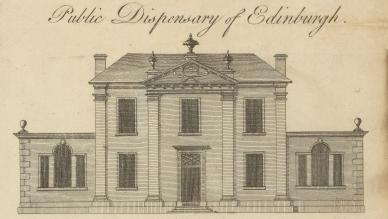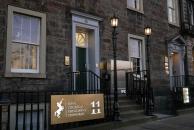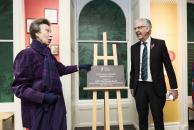

College launches The People’s Dispensary Website
10 July 2025
Royal College of Physicians of Edinburgh launches The People’s Dispensary Website
Edinburgh patient experiences from the 1700s revealed
The Royal College of Physicians of Edinburgh is delighted to announce the launch of a new website, The People’s Dispensary: https://www.rcpe.ac.uk/peoplesdispensary
At its core, The People’s Dispensary features a digitised and transcribed collection of 18th century case notes of the Edinburgh Public Dispensary from its foundation in 1776. Located in Edinburgh’s Old Town, it provided free diagnosis and medicines to the city’s sick. Users of the website will be able to search these digitised and transcribed records which feature fascinating details about the diseases, treatments and experiences of poor patients in 1700s Edinburgh.
The digitised and transcribed 18th century patient case notes feature over 10,000 pages of patient records. It is a unique resource as the only surviving collection of 18th century dispensary patient case notes in Britain and contains 1,372 patients, 174 medical practitioners and 900 diseases and treatments.
Daisy Cunynghame, Heritage Manager & Librarian, says:
We are excited to bring this collection to the public eye and very proud of the efforts of colleagues and volunteers that were involved in creating this web resource.
These records contain amazing insight into the experiences of poor patients in 1700s Edinburgh. So often when stories are told of medicine and sickness in Georgian Britain, they focus on people who wrote letters and kept diaries – people who were middle and upper class.
Through this new website we can share details of the experiences of the less well-off who relied on charitable medicine.
The case notes are really remarkable – we find out about a woman who swallowed two pistol bullets as a folk remedy for her constipation.
Our hope is that the website will encourage our audiences to learn about and reflect on what life was like for ordinary people in historic Scotland.
Professor Mark Strachan, Heritage Trustee, says:
Although modern medical treatments bear little relation to those prescribed in the Edinburgh Public Dispensary, we can still see many parallels between past and present practice. The need to balance potential side effects of the treatment against the consequences of not treating an illness, the adverse health consequences of certain occupations and the challenge for women in having symptoms of illness believed by doctors were as common in Georgian Britain as they are today.
Some interesting points:
• One of the recommended treatments was sea bathing. But there was a risk attached. In the case of Margaret Gray, a patient admitted to the Edinburgh dispensary in the winter of 1781 with a diagnosis of hysteria, it was recommend that she bathe in a tub or ‘form of shower bath’ rather than sea bathing, because ‘in deep water fatal consequences in the way of drowning have sometimes happened’
• Dispensary physicians recorded the home remedies that patients had already tried, including a remedy provided by a ‘benevolent lady, the widow of a Clergyman’. Sometimes the physicians did not approve, including in one case where an individual applied burnt butter to their child’s head, as a treatment for a fungal infection, ‘by the advice of some officious neighbours’
• The case notes record the occupations of many of the patients, and the impact that their diagnosis had on their health. This included street hawkers, labourers and servants. Two very Edinburgh-specific occupations were water carrier and chairman. The water carriers’ job was to collect water from the well and then deliver it to individual homes across the city. Chairmen – the carriers of sedan chairs – were also much more common in Edinburgh than other cities. Because of the Old Town’s narrow and winding streets, it wasn’t possible to travel around much of the city in a horse and cart, so chairmen were employed instead to carry their employers throughout the city. And a lot of the medical problems of both carriers and chairmen were admitted into the dispensary for were clearly related to their line of work – particularly chronic back pain and rheumatism.
• Dispensary physicians would regularly record their concern that female patients were faking their medical conditions in order to be prescribed medicines which would bring about an abortion.







